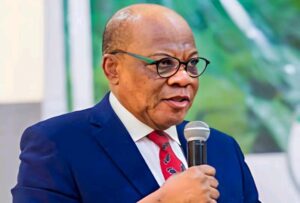
Dr. Olisa Agbakoba, a former president of the Nigerian Bar Association, revealed how the late General Sani Abacha gave the order to kill 200 demonstrators during a dramatic clash in Lagos in 1993..CONTINUE FULL READING>>>>>
While drawing attention to the exclusion of a few significant figures from President Bola Tinubu’s most recent National Honours list, the Senior Advocate of Nigeria revealed the information in an interview with Channels TV. “Agbakoba recounted the deadly encounter that occurred when pro-democracy activists blocked Abacha’s entry into Lagos from Abuja during the height of Nigeria’s political crisis.”
“Abuja and Lagos were co-capitals on July 6, 1993. Thus, Abacha and all of the ministers were in Abuja. They arrived in Lagos by plane. Not a single minister had the guts to show up. We blocked everything, so it was Abacha who got through,” Agbakoba disclosed. The senior attorney emphasised that the victims should be honoured as democratic heroes while outlining the violent outcomes of the altercation. They’re not named, but he (Abacha) came through and killed 200 of my boys that day. He emphasised the underappreciated sacrifices made throughout the fight for democracy by saying, “They should be recognised as heroes of democracy.”
During the demonstrations, Agbakoba and fellow activist Beko Ransome-Kuti came dangerously near to death. We were resolved to march from the stadium to Dodan Barracks, therefore Beko (Ransome Kuti) and I would have been slain on the bridge. As a result, several men were left off the list,” SAN Agbakoba noted. Former inmates who shared his fight against military authority were highlighted by the senior lawyer. He emphasised that they should be on the list, saying that Baba Omojola and Femi Ojudu were his prisonmates for almost six months.
Clement Nwankwo was also highlighted by Agbakoba, who said that he was “co-founder of the Civil Liberties Organisation (CLO) with him and should have been recognised.” The senior lawyer described his involvement in significant anti-military demonstrations that influenced Nigeria’s democratic transition in order to highlight the importance of underappreciated efforts. According to his disclosure, on July 6, he was “co-commander of a street protest involving 10,000 people alongside the late Beko Ransome Kuti, which led to the ouster of General Babangida on August 23.”
In subsequent protests, Agbakoba again referred to his leadership role, stating that “on March 28, 1998, he was commander of the street protest during the 5 million man march, which opposed the youths in Kano who were asking and drumming up support for Abacha to stay in power.” The senior counsel did, however, convey hope that the administration will rectify the omissions. He recommended that “when the federal government realises the oversight in their selection, they can fill up the missing names, stating that it’s not a problem to rectify the omissions.”CONTINUE FULL READING>>>>>


